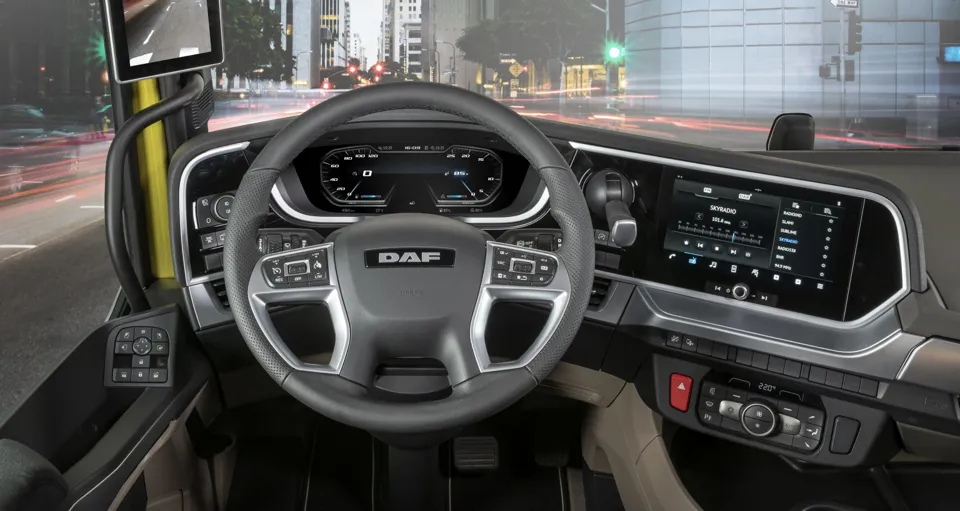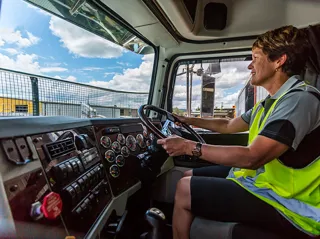Ministers have unveiled a package of measures to tackle the HGV driver shortage and ease pressure on the sector.
They include launching a consultation on allowing drivers to take one test to drive both an articulated and rigid lorry. This, says the Government, would streamline the process for new drivers to gain their HGV licence and would increase lorry test appointment availability.
The consultation has now concluded. For the latest on this story, click here.
The driver shortage is hitting crisis level in the UK, with demand increasing across supply chains as the country recovers from Covid-19.
The pandemic has resulted in the loss of about 12 months of driver training and testing, while online retail averaged 28.1% of retail sales in 2020, according to Logistics UK, up from 19.2% in 2019.
In an effort to help alleviate the pressure, ministers have pledged to work with industry leaders to attract new drivers, simplify training and encourage people to stay in the industry in an open letter to the road haulage sector.
The Driver and Vehicle Standards Agency (DVSA) has already worked to ensure almost 1,500 HGV drivers pass their driving test every week, says the Government.
However, compared with 2019, there were 43% less tests conducted in 2020, with 35% of these conducted in the first quarter (January to March), when fewer than 15,000 tests were carried out, prior to the advent of the pandemic.
And, during the first lockdown period of April through June, only 631 tests took place. By comparison, in 2019, 18,625 tests were conducted over a similar period.
The new consultation to allow drivers to take one test to drive both an articulated and rigid lorry will also look at allowing trainers to examine drivers in the off-road manoeuvres part of the HGV driving test, and look at whether specific car and trailer tests should be required.
This, it says, will allow a significant increase in the number of HGV driving tests to be conducted whilst maintaining road safety standards.
Elizabeth de Jong, policy director at Logistics UK, said: “It is good to see the urgent focus placed by Government on increased HGV driver testing with DVSA, as this is currently the biggest blocker to new entrants entering the workforce, but without targets and a workable timeline, this is simply a statement of intent.
"We need to know how soon the backlog of 25,000 test passes can be cleared more swiftly by the DVSA, as we estimate at current rates this will take 27 weeks."
She also welcomed proposals for reform of the vocational driving test process to increase test capacity, but believes it will take time to make the necessary changes to legislation, and for it to be implemented on the ground, before the full benefit can be felt.
She added: "As always, Logistics UK will continue to work proactively with all areas of Government to identify the tangible steps that need to be taken on the route to implementation of this plan, to deliver the support our industry needs as it helps the country to get back on its feet.”
Transport secretary Grant Shapps said: “I want to thank all those in the road haulage industry who have worked so hard throughout the pandemic to provide such a vital service.
“I understand the challenges faced by drivers and operators right now, and while longer-term solutions must be led first and foremost by industry leaders, today we are saying this Government is here to help.
“This set of measures will kickstart that help, easing pressure on the sector as we work together to attract new drivers, improve conditions and ensure the industry’s future is a prosperous one.”
IMPROVING WORKING CONDITIONS FOR HGV DRIVERS
The Government is also looking to help the road haulage sector improve the working conditions of drivers – something which is key to addressing the shortage.
It says it will support this by working alongside the industry to support more official parking spaces for lorry drivers and look at ways to improve the standard of lorry parks.
More than 1,400 HGV drivers will be forced to spend the night sleeping in their cabs tonight, due to a chronic lack of safe and secure parking spaces for their vehicles, according to Logistics UK.
Despite previous assurances from Government that provision of adequate locations for drivers to take their legally mandated rest breaks, including short stops and overnight stays, would be prioritised, de Jong says a lack of progress means that drivers are still being forced to put themselves and their loads at risk, and new entrants to the sector are being deterred from applying.
She said: “Whether working in a factory, retail outlet, office or at home, we all take it for granted that we have access to a toilet, handwashing facilities, a hot shower and food when we need it, as well as somewhere safe and secure to have a rest.
“Yet for many HGV drivers, these basic human rights are still a fantasy. No one wants to see drivers forced to park up on the roadside, on industrial or retail parks or in public spaces but for many of those tasked with keeping UK plc stocked with everything it needs, there is simply no alternative – and this situation is hindering the diversification of our workforce. That is not acceptable.”
Currently, it is estimated that less than 1% of the HGV drivers working on the UK’s roads are women, but with no reassurance of safety and security when taking a legally required break, even for a couple of hours, no woman would want to put herself in a potentially risky situation, according to de Jong.
“Industry can only do so much to attract new entrants to the industry,” she continued. “We need Government to prioritise the provision of new parking areas across the strategic roads network so that all potential employees can regard an HGV driving job as a safe and highly valued role.”
The Transport Focus 2020-21 Logistics and Coach Survey found that 56% of respondents rated the availability of parking spaces for their vehicles as “fairly poor” or “very poor”, while a survey published by the Department for Transport (DfT) in 2017 identified an urgent need for 1,400 safe overnight parking spaces in England.
“The plans revealed by Government today only go part of the way to addressing the crucial problem areas that the industry has been talking with Government about for years,” said de Jong.
“After all the incredibly hard work to keep the country stocked with all that it needed throughout the pandemic, it is dispiriting to see that the safety and security of our workforce in the course of doing their jobs is still not being prioritised.”
Logistics UK says that the plan also needs concrete targets and timelines to help the industry recruit more drivers.
YEAR OF LOGISTICS
Ministers are keen to hear more from sector leaders about an industry-led Year of Logistics, looking at various other ways to attract more people to join the industry from all parts of society.
Secretary of state for work and pensions, Therese Coffey, said: “As part of our Plan for Jobs, we are helping people gain the skills and experience needed to take up opportunities in the haulage sector, including access to key training, and our Jobcentres are playing a vital role in matching jobseekers with the right roles in the sector.”
The Department for Work and Pensions will continue to encourage those who have already left the industry to re-join, confirming that they are developing a new driver training pilot through Jobcentre Plus to bring job-seekers into the industry, it says.
The Government has also called on local councils to be flexible around delivery times to supermarkets and other retailers, allowing drivers to make deliveries earlier in the morning or later in the evening where necessary.
Environment secretary George Eustice said: “Our road haulage key workers have worked tirelessly throughout the pandemic and formed a vital part of the unprecedented response, moving goods and ensuring supplies kept flowing across the nation.
“The Government is committed to supporting the logistics industry, which is why we are introducing this package of practical measures to support recruitment and retention of drivers.
“This follows the recent relaxation to drivers’ hours and supermarket delivery hour restrictions to further support the industry.”
The recently-announced temporary relaxation of drivers’ hours rules allows HGV drivers to make slightly longer journeys, but the DfT says this must only be used where necessary and must not compromise driver safety.

























Edward Handley - 22/07/2021 12:05
The Government's immediate response to the shortage of drivers - extending their working hours - just shows how little they understand about the problems the industry faces. Excessive working hours and fatigue are already a problem in the industry and extending the drivers working hours just makes it worse. The driver shortage has been building up for at least 20 years and was covered up by Eastern European drivers taking up the slack, but it was inevitable that most would return home after a few years once they had saved up enough, just like the British who went to work in the Gulf in the 70s and 80s. If the Government want to ease the shortage now there are several things that would make an immediate difference. The first is to suspend the requirement to hold a DCPC card for 6 months, which would immediately improve the supply of part time drivers without interruping CPC training which is actually very valuable. Second is to tell DVSA to ease off on the heavy penalties imposed on drivers for trivial offences such as forgetting to change mode on the tachograph, as the heavy hand of enforcement is a definite deterrent to working as a driver. Thirdly, simplify the theory test and initial DCPC requirements: Drivers have to pass a thory test, a hazard perception test, and a CPC "case study" test before they can take a practical test, and each test has a failure rate and creates extra delay in attending training and taking the practical. The main reason these tests have become such a barrier to training was the EU requirement for drivers to have 6 hours of testing which the UK typically interpreted very strictly. When the tests were first introduced in 1997 drivers were allowed to take the practical test and if they passed they could drive for 6 months during which time they could take the theory tests. All that would take is a Statutory Instrument!